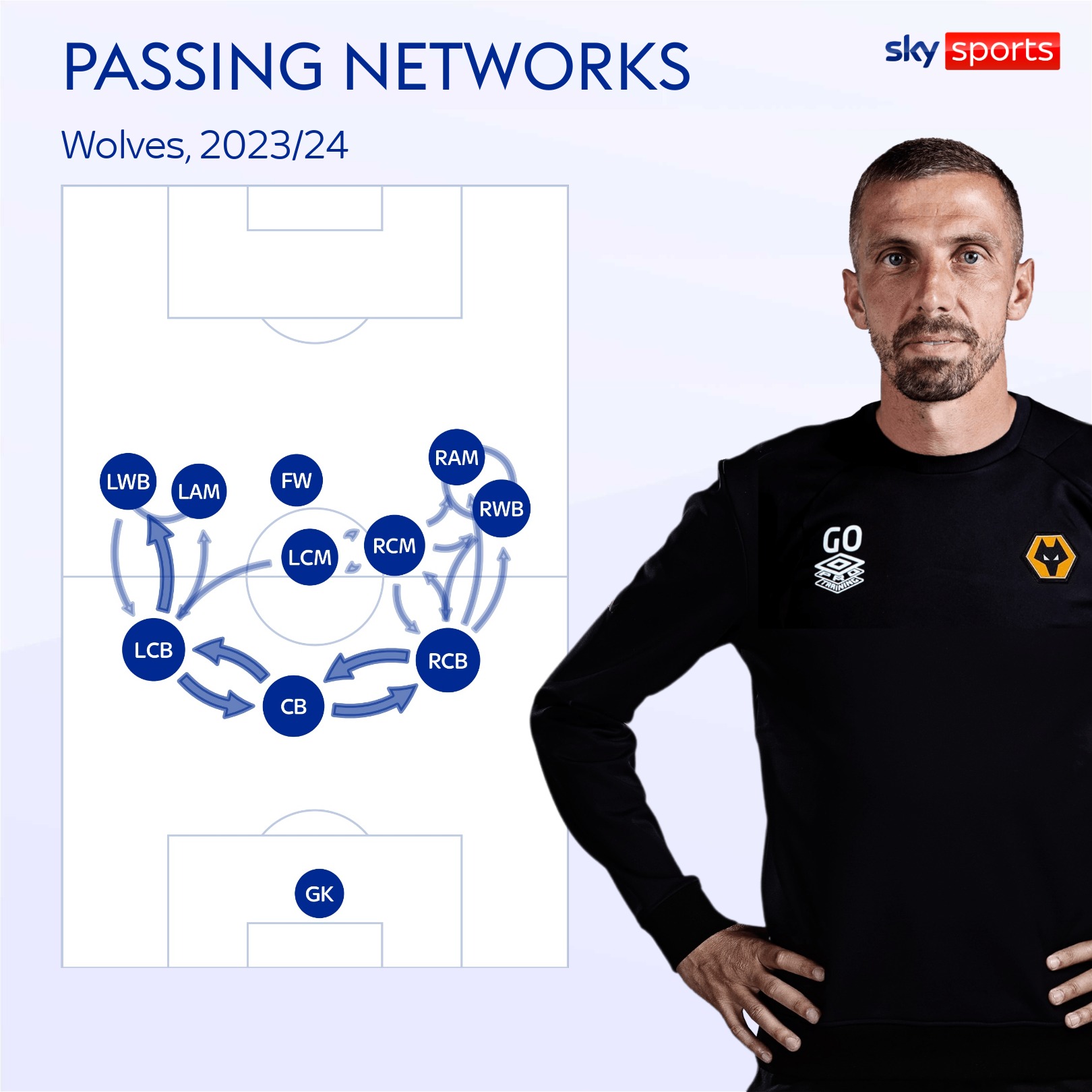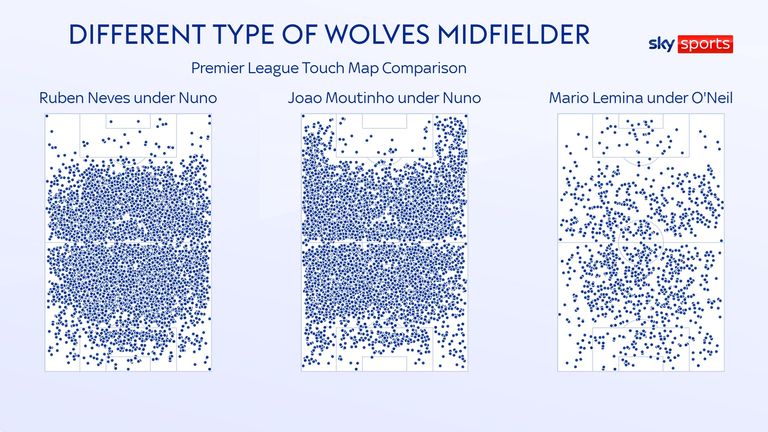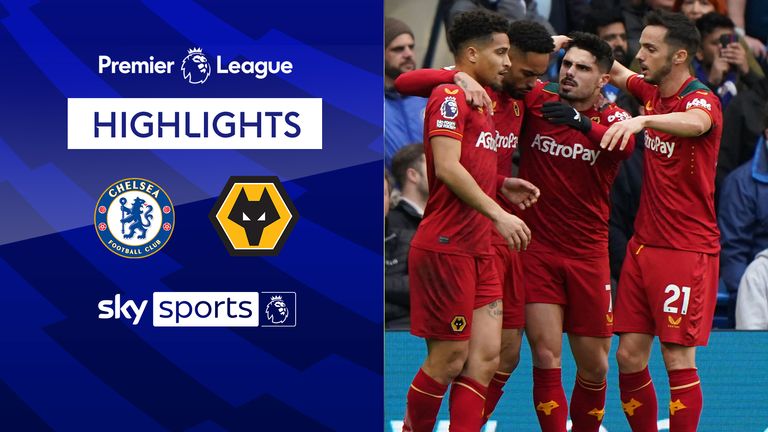Gary O’Neil’s Wolves: Improving Pedro Neto and Matheus Cunha to transform Premier League’s lowest scorers
Wolves boss Gary O'Neil has turned the Premier League's lowest scorers into entertainers against the odds, but how has he transformed their fortunes in front of goal? Adam Bate on a tale of improving individuals and the tactical tweaks that have made it possible
Wednesday 7 February 2024 10:43, UK
When Wolves beat Brentford 4-1 just after Christmas, it was the first time that the club had won an away game by scoring four goals in Premier League history. Just five weeks later, against Chelsea, Gary O’Neil’s team managed to do it again.
The 4-2 win at Stamford Bridge will be framed in the context of a Chelsea crisis but there is another side to the story. Wolves, the Premier League's lowest scorers last season, are on course for their best goals-per-game record in the top division for 60 years.
Stan Cullis was the manager then. There is a statue of him at Molineux outside the stand that bears his name, honouring the man who took Wolves to three titles. Few expected much to celebrate this season let alone statistics harking back to the glory days.
The gloom that engulfed Wolves in the summer is oft-cited but worth repeating in any attempt to fairly assess what has followed. Fan favourites departed as the demands of profit-and-sustainability regulations became clear. Julen Lopetegui left in frustration.
What hope if even the manager did not believe?
O'Neil was not unaware of "how many pundits and media had written the group off and how many bottom threes we were predicted to be in" when he walked through the door just days before Wolves' season kicked off away to Manchester United at Old Trafford.
But he galvanised the group quickly, his diligence winning over the players - and then the supporters. Beating Manchester City and Tottenham created some memories. Winning away at West Bromwich Albion for the first time in 28 years helped too.
The togetherness has been striking. Relationships had to be built on the fly but thanks to hours on the training ground and the insights that have helped to improve performances, it is working. O'Neil has simply made so many of these Wolves players better.
This has been a tactical triumph. One of the key moments came in the seventh game of the season. There had been some encouraging signs in those first half a dozen Premier League games but only one had been won and none in front of their own fans.
That win over Man City had added significance because O'Neil tweaked the team's shape, adding another defender in Toti Gomes. He has started every game since and, as of Sunday, Wolves could claim to have picked up as many points as City since that day.

It represented a return to the 3-4-3 shape that Nuno Espirito Santo had used to such good effect when taking Wolves to back-to-back seventh-place finishes. But it was more flexible. O'Neil even sees it as a back four at times. Crucially, it is much more attacking.
Consider the roles of the two midfielders. Wolves had good control with Ruben Neves and Joao Moutinho, both players remaining heroes to the supporters even after leaving. But what they did not really do, particularly under Nuno, is threaten the penalty box.
In 109 appearances each in the competition under Nuno, Neves and Moutinho had 28 and 24 touches inside the penalty box, respectively. Mario Lemina, the senior man in Wolves' current two-man midfield, has eclipsed that tally in just 20 games under O'Neil.
Wolves get players into the box now. There was no great reason to expect Lemina to be making a move beyond the last line of defence deep into stoppage time against Spurs in November. But the fact that he made that run allowed him to score the winner.
Against Chelsea, it was Rayan Ait-Nouri making a run across the front post to latch onto Pedro Neto's cross and put Wolves in front for the first time. Players inside the box have transformed an attack that most assumed could not score the goals required.
After Wolves blanked in that opener against United despite having more shots than any away side in a Premier League game at Old Trafford in over a decade, this reporter asked O'Neil whether he really believed these players could deliver in front of goal.
"If we have 23 shots every game and still have not scored, then I will be concerned," he replied. "At this moment, I see players of real quality, players who are capable. My job is to keep getting them to arrive. My job is to work with them on being more clinical."
At the start of September, upon losing away to Crystal Palace, there was still more than a little scepticism when O'Neil said: "We had 60 final-third entries, which is a lot for an away game, and more than Palace." But he was right. And the goals soon did begin to flow.
The potent trio of Matheus Cunha, Pedro Neto and Hee-Chan Hwang, currently away on Asian Cup duty with South Korea, have defied the doubters. "I would bet that all of them are pretty close to their best at the moment, returns-wise," says O'Neil. And he is right.
This is already the best scoring season of Cunha's career. Hwang has doubled his previous-best total in a major European league. Pedro Neto ranks third in the Premier League for assists. He has eight of them so far, despite missing two months due to injury.
The temptation when watching Wolves in full flow is to think that the three have been unleashed, talented players given the freedom to express themselves. "Sometimes the game becomes random," says O'Neil, "and they need to figure stuff out for themselves."
But, for the most part, the opposite is true. The improvement is a result of prescribed movements, patterns of play that had been lacking. Hwang took those instructions on board quickly. Cunha's adaptation process took longer but has been just as spectacular.
The Brazilian was always gifted, hence Wolves parting with £43m to bring him to the club last winter. In 2019, he was nominated for the Puskas Award after a sensational solo effort for RB Leipzig against Bayer Leverkusen. A scorer of great goals but not a great goalscorer.
Speaking to O'Neil about this in December, he offered an insight into the conversations between player and coach. He had been urging Cunha to pick up the positions that produce results as well as gasps from the crowd. It was about being more effective.
"When you are a No 9, which he has had to be at times this season, we need you to do this and this, but every time the ball is crossed I need my No 9 to be a threat. You have to be. OK, Matheus Cunha does this and this really well but he has to do this. You have to.
"People actually watching the game will see that he came off the front, did a little turn, popped it to the winger. Great. But how many goals has he got? How many assists has he got? I am trying to work with him on that, which he takes exceptionally well."
That ongoing dialogue appears to have worked. In eight appearances for Wolves in all competitions since Christmas, Cunha has provided three assists and scored six goals, culminating in his hat-trick against Chelsea. Having added goals, he now has it all.
And the football suits these Wolves players better now.
This is not a pure counter-attacking team - they rank 12th for possession. But they are in the top half for direct attacks, transitions entering the final third and drives into the box - metrics that hint at their pace. No team has completed more dribbles.
- Live Premier League table | Fixtures | Results
- Watch free Premier League highlights
- Stream Sky Sports with NOW | Get Sky Sports
Given space in which to attack, this is a Wolves team that can be devastating. Perhaps that explains why they have won as many games against the so-called 'big six' teams as they have against the current bottom six teams in the Premier League table.
That challenge of breaking down deeper defences is one that Wolves will need to solve if the improvement is to continue but, speaking to O'Neil, he is aware of this. With the attention to detail that is fast becoming a feature of his coaching, expect him to find the solutions.
"We are not there yet. When Manchester City come, the question is whether you can defend well and you can attack quickly. We need to have the answer to that. You may get some who come to frustrate you a bit, so now it is not going to be on to attack quickly.
"So we need to have a good understanding and try to pick our moments. Trying to give the group enough information so that they can do whatever is put in front of them is where I try to go with it. I have not got them there yet but I will keep working on it."
O'Neil might dispute the notion that there is an obvious first-choice starting line-up. Pablo Sarabia and Tommy Doyle, for instance, continue to make useful contributions. But the imminent prospect of reuniting Hwang with Neto and Cunha is an enticing one.
A combination of international commitments, injuries and suspensions means that the side that beat Manchester City has only been seen for 45 minutes since, in the draw with Aston Villa. If this small squad can stay fit then that 60-year goal record will be broken.
And the reputation of Gary O'Neil will continue to grow.







